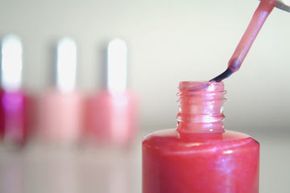Have you ever stood in the drugstore with chipped nails and stared blankly at all your options for nail polish remover? You're not alone.
The main decision you have to make is whether you want acetone or non-acetone nail polish remover. Here's the simple secret: While acetone will work faster at getting the polish off of your nails, non-acetone removers will be gentler to them.
Advertisement
So what's in these removers, anyway? Acetone is a clear, harsh-smelling and highly flammable liquid. It's a solvent, capable of disintegrating even plastic. This explains why it works so quickly breaking apart and removing your nail polish. Isopropyl alcohol is typically used in the making of acetone.
The key active ingredient in non-acetone removers is usually ethyl acetate. Made from ethanol and acetic acid, ethyl acetate is colorless and also flammable. In addition to also being used as a solvent, its fragrant smell has led to its use in perfumes.
Most of your nail polish removers are going to include solvents as ingredients. If you can remember your lesson about polymers from high school chemistry class, think of it like this: Your nail polish remover is an organic liquid solvent. Nail polish is a hardened organic polymer. When the remover is applied to the polish, the molecules of the solvent will force their way through the polymer molecules, causing the polish to disintegrate.
Because of acetone's strength as a solvent, it shouldn't be used on your fake nails. The solvent in the polish remover will weaken your extensions and cause them to separate from your natural nail. One of the reasons non-acetone nail polish removers were created was to be used on nail extensions.
But for removing sparkly, glitter nail polish, it's best to go with the big guns -- acetone polish remover. The chemicals in glitter nail polish make it more difficult than other polishes to break down.
If you have strong health concerns about the chemicals used in both acetone and non-acetone polish removers, you should consider switching to a nail polish remover that doesn't use toxic ingredients. There are also many polish removers on the market today that boast of being fully "natural" and biodegradable.
Advertisement


